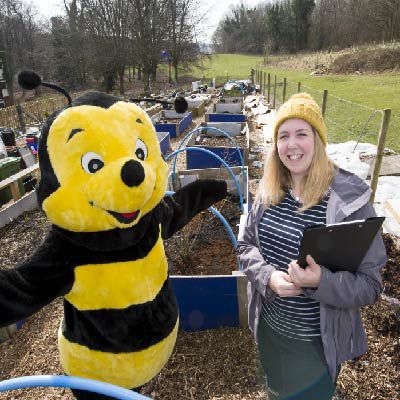Dr Beth Nicholls
Dr Beth Nicholls is an established Research Fellow in the department of Evolution, Behaviour and Environment (School of Life Sciences), with a particular interest in the behaviour of bees.

Beth's story
Her postdoctoral work with the Sussex Sustainability Research Programme (SSRP) was a key milestone in her early career as a researcher.
Research with SSRP
Back in 2017, Prof Dave Goulson recruited Beth to coordinate the SSRP-funded project ‘People, pollinators and pesticides in peri-urban farming', an opportunity that she embraced to the fullest. Funding from SSRP allowed her to work for two years on this project, which studied two contrasting peri-urban systems: Brighton and Hove, UK; and Kolkata, India. Beth led the British side of the project, which piloted a ‘citizen science’ approach of data collection where urban growers monitored pollinators and crop yields. This methodology was then replicated in India, through a collaboration with the Centre for Agroecology & Pollination Studies, University of Calcutta. Beth learned about co-creating research with stakeholders, such as engaging directly with Indian farmers to develop creative methods of data collection.
By leading on an SSRP project and designing many aspects of the research, I really developed my own independence.”
Media engagement
By quantifying the productivity of urban farms in Brighton and Hove, and the percentage of the harvest owed to insect pollination, Beth showed that the yields from small urban spaces for some crops were comparable to those from conventional farms. This significant finding, previously published in a Special Issue of the Sustainability Science Journal, caused a stir in the media, with coverage by BBC Radio 4 and articles in The Times, The Guardian, The Telegraph, and The Independent highlighting the important role of urban food production in food security and sustainability.
Interdisciplinary networks
Networking events curated by the SSRP were instrumental to support the interdisciplinary nature of Beth’s project:
I always wanted to bring more social sciences into my research, because particularly in conservation it is very important to try and include the perspectives of all the different stakeholders, and being part of the SSRP really helped me to connect with researchers from other departments and learn more about the methods they used.”
More recently, the SSRP has helped Beth engage with scholars from agricultural economics, engineering, and geography, who are interested in urban farming in the South African context and with whom she plans to write a grant proposal.
Partnerships
Through her involvement with the SSRP project, Beth built a network of growers and food-focused organisations in Brighton and Hove, such as the Brighton and Hove Food Partnership and the Brighton Permaculture Trust. Now, she aims to formalise these partnerships by using funding from the SSRP Impact Fund to engage directly with local communities and raise awareness around the potential of urban food production and the importance of pollinators.
After working with the SSRP
A culminating point in Beth’s career consisted of receiving a £1.3 million UKRI Future Leaders Fellowship, which allowed her to establish her own lab at the University of Sussex to study the foraging choices of bees and their implications for pollination. Besides research, she has worked in a public outreach role with the South Downs Park, engaging underrepresented communities in a heathlands restoration project.